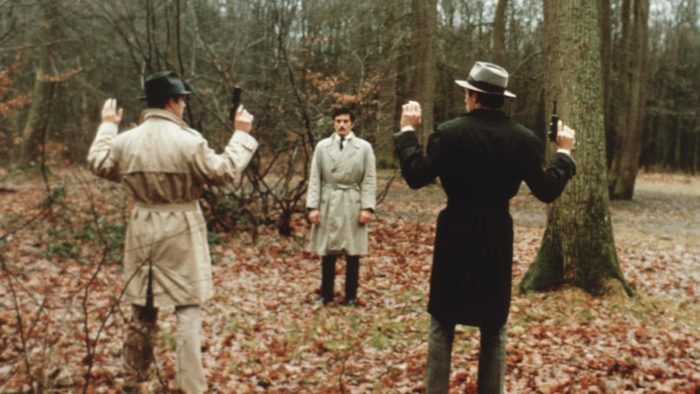
Siddhartha Gautama, the Buddha, drew a circle with a piece of red chalk and said: “When men, even unknowingly, are to meet one day, whatever may befall each, whatever the diverging paths, on the said day, they will inevitably come together in the red circle.”
Jean-Pierre Melville made up that Buddha which quote opens his Le cercle rouge and I am feeling it. My red circle with this film is a wide one, reaching way back to the first time I heard about it on an episode of Filmspotting from 2008 (to give you a better sense of time, it was the one where Adam and Matty reviewed Pineapple Express). That was part of their Classic Heist marathon, which I am still woefully ignorant of, but in theory very interested in consuming. Don’t believe me? That’s fair, but it motivated two draft picks in the very first Criterion Month. Those were Rififi, which directly inspired Le cercle rouge, and another Jean-Pierre Melville film, Le Samouraï. And it keeps going: Le Samouraï was indirectly remade in a couple more of my later picks, The Killer and Ghost Dog: The Way of the Samurai. So this really does feel like a homecoming.
A lot of the main beats of Le cercle rouge mirror Rififi, including opening with a jewel thief being released from prison. Instead of le Stéphanois we get Corey (Alain Delon), a man with a fierce mustache. His peaceful release into civilian life is juxtaposed by Vogel (Gian Maria Volonté), another prisoner who is being taken by train from Marseille to Paris. Overnight, Vogel manages to pick the lock to his handcuffs and leap out of the window, desperately evading a massive police manhunt. Meanwhile, Corey goes to visit his crime boss, Rico (André Ekyan), who he intimidates and robs. Rico sends some goons after Corey, but he beats them up in a pool hall and then skips town by buying a car with the money he stole from Rico. When Corey hears about the manhunt on the radio, he decides to stop at a diner and leave his trunk conspicuously ajar. Vogel eventually shows up and takes the bait.
Corey drives until there’s no one around, then pulls over and invites Vogel to come out. Vogel holds him at gunpoint but Corey is unfazed, offering Vogel a cigarette. They instantly become friends, and, yada yada yada, they end up at Corey’s apartment in Paris. Once there, Corey tells Vogel about a potential job a prion guard had told him about: there’s a local jewelry store that’s prime for the taking. They just need one more guy: a marksman. Vogel recommends an old buddy, Jansen (Yves Montand), a retired cop and current drunk. All the while, Inspector Mattei (André Bourvil) is closing in on the fugitives and growing increasingly cynical as he keeps meeting lowlife criminals on the way.
Like Rififi, I’m struck by what a low percentage of the total runtime the actual heist in Le cercle rouge takes up. This movie is 160 minutes long and the heist happens maybe about two thirds of the way in and can’t be more than a half hour long. More time is dedicated to the beginning part of the story, as Melville develops who these guys are and why they’d chose to do a job like this. Which is more challenging than it sounds because the main trio are all really cool guys who don’t say much. I’m used to movies like Ocean’s Eleven and Fast Five, where planning and heisting make up the majority of the story, but I can’t complain too much, since Le cercle rouge does let us see basically the whole job in real time.
Unfortunately, Le cercle rouge doesn’t have the cool old timey gadgets Rififi had. This heist is surprisingly straightforward except for the one cool part where they show why they needed a marksman. Also, Alain Delon’s mustache looks great and he is still really cool, he’s just not Le Samouraï cool. Sometimes its hard to live up to your own standards. So what makes Le cercle rouge special amongst those three movies? Atmosphere. This movie is set during a cold, rainy winter in France which perfectly matches the weary, dark tone of the story. You can probably guess from the title and the Buddha quote where this movie is headed, so Melville was smart to lean all the way into that gloomy feel. It doesn’t make it as “fun” as the heist fantasy can be, but, you know, crime doesn’t pay.


